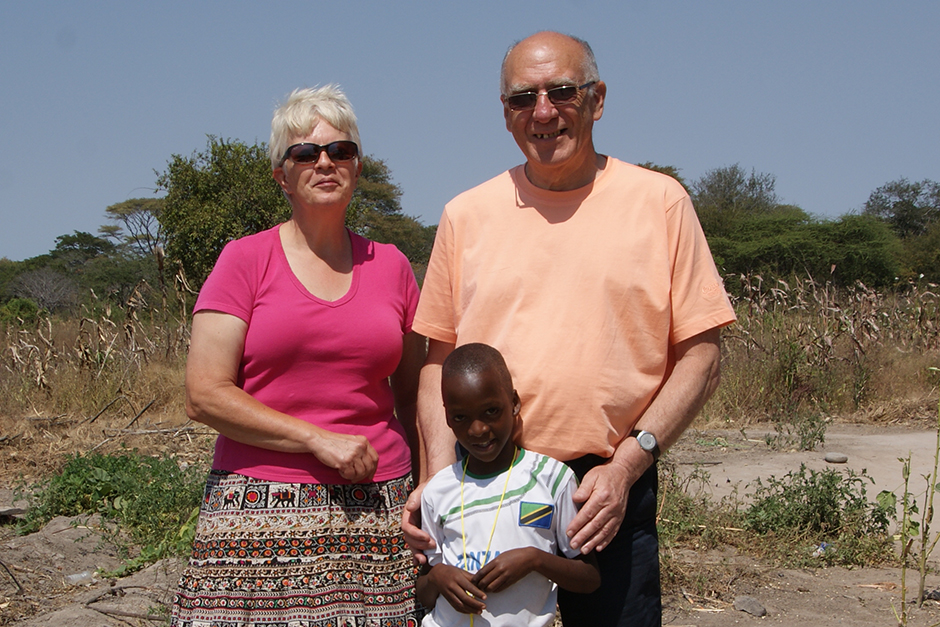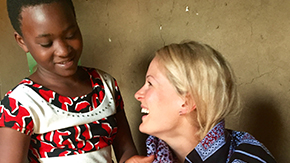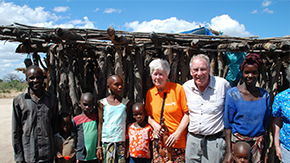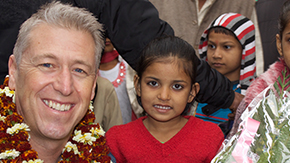Nigel and Sue Hodder, lovely World Vision child sponsors, recently visited the Kilimatinde project in Tanzania – a community facing poverty but so rich in character. Below Nigel shares their experience with us.
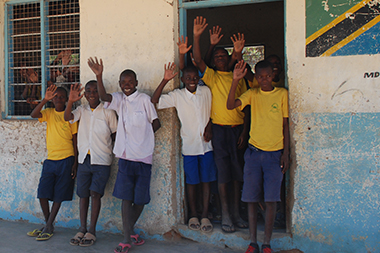 As part of a group of sponsors visiting Tanzania, my wife, Sue, and I have recently been able to see first-hand what good use World Vision has put to our sponsorship money. We visited Kilimatinde, the community where Reginard, our sponsored child lives, shortly after the monsoon season. It was so apparent how quickly the water gets used up when you only get one period of rainfall a year. Rivers were already drying up and the ground started to look parched again. But help was at hand. We visited a water storage tank which was being fed by water pumped up 130 metres from a bore hole using a very shiny engine – the villagers take pride in their equipment and the generator sparkles as though it is still brand new! This tank is providing clean drinking water for a number of small hamlets and villages via stand pipes and also feeds a trough for grazing livestock. We also saw the irrigation canals that are being built to help increase the yield from arable farming. There are modest charges for use of this water but they become affordable because other income generating projects in the area have been developed with the help and support of the World Vision team.
As part of a group of sponsors visiting Tanzania, my wife, Sue, and I have recently been able to see first-hand what good use World Vision has put to our sponsorship money. We visited Kilimatinde, the community where Reginard, our sponsored child lives, shortly after the monsoon season. It was so apparent how quickly the water gets used up when you only get one period of rainfall a year. Rivers were already drying up and the ground started to look parched again. But help was at hand. We visited a water storage tank which was being fed by water pumped up 130 metres from a bore hole using a very shiny engine – the villagers take pride in their equipment and the generator sparkles as though it is still brand new! This tank is providing clean drinking water for a number of small hamlets and villages via stand pipes and also feeds a trough for grazing livestock. We also saw the irrigation canals that are being built to help increase the yield from arable farming. There are modest charges for use of this water but they become affordable because other income generating projects in the area have been developed with the help and support of the World Vision team.
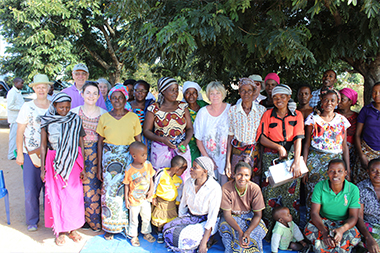 We witnessed a thriving savings group which had been established – started by the purchasing of a share for 500 shillings (about 20 pence). Members of the group are able to take out a business loan to be repaid with an agreed rate of interest plus penalties for failure to meet repayment criteria.
We witnessed a thriving savings group which had been established – started by the purchasing of a share for 500 shillings (about 20 pence). Members of the group are able to take out a business loan to be repaid with an agreed rate of interest plus penalties for failure to meet repayment criteria.
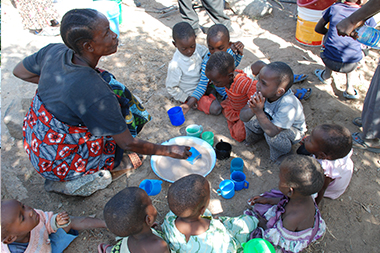 We heard from a nutrition group who teach mothers, in particular, which food to make to give the best nutrition levels for their children with the minimum of cost. We were given the opportunity to make our own doughnuts which were absolutely delicious (well, most of them were!).
We heard from a nutrition group who teach mothers, in particular, which food to make to give the best nutrition levels for their children with the minimum of cost. We were given the opportunity to make our own doughnuts which were absolutely delicious (well, most of them were!).
We also attended a primary school and later a children’s parliament where we were able to interact with the school children in both an educational and cultural sense. They were as interested in us as we were in them and it became very clear how they were learning to cope with abuse and realised that children have rights, too.
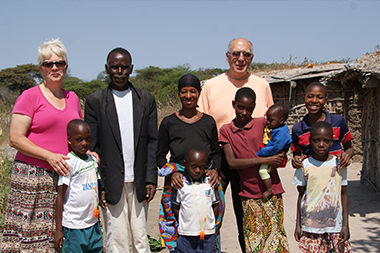 The trip also provided the opportunity to meet Reginard and his family whom we have been sponsoring. Reginard had told us in his letters that he had 5 brothers and sisters but it was only when we got into the detail we realised that a cousin who is living with the family is treated as a sibling. So, in reality, Reginard has one brother and one sister but his family have taken responsibility for three other children (cousins) following the death of another family member.
The trip also provided the opportunity to meet Reginard and his family whom we have been sponsoring. Reginard had told us in his letters that he had 5 brothers and sisters but it was only when we got into the detail we realised that a cousin who is living with the family is treated as a sibling. So, in reality, Reginard has one brother and one sister but his family have taken responsibility for three other children (cousins) following the death of another family member.
These are parents who strive to support their offspring in the harshest of climates. Reginard’s father makes beehives which he sells in the village; they also make their own honey which generates some income but the loss of their chickens due to Newcastle, a common disease in this area, which while curable can wipe out a whole flock very quickly. It should be said that the family live in a hamlet of 9 or 10 houses about 2 miles from the main village so isolation is an added difficulty. We met a number of families who all (despite their tough existence) wished for us to share a meal with them.
We even received gifts from the family – treasured memories of our all too brief visit to the area.
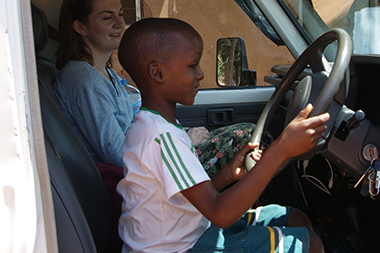 After our visit to Reginard’s house we were treated to local entertainment by members of the village. Reginard, a shy 8 year old, attended the show and it was noticeable that while he initially sat with his pals some way from us, he encouraged his friends to move to a position much closer. We couldn’t help watching his smiling glances as his eyes wandered from the show to Sue and me. That was a very special and rewarding moment which left us very emotional when the time came to leave the village and the likelihood dawned that we may never see him in the flesh again. But we know the relationship between us is now a very different one and the experience of having visited his home and met his family and neighbours means that letters between us will be far more interesting from now on.
After our visit to Reginard’s house we were treated to local entertainment by members of the village. Reginard, a shy 8 year old, attended the show and it was noticeable that while he initially sat with his pals some way from us, he encouraged his friends to move to a position much closer. We couldn’t help watching his smiling glances as his eyes wandered from the show to Sue and me. That was a very special and rewarding moment which left us very emotional when the time came to leave the village and the likelihood dawned that we may never see him in the flesh again. But we know the relationship between us is now a very different one and the experience of having visited his home and met his family and neighbours means that letters between us will be far more interesting from now on.
We feel blessed to have had the opportunity to visit this extremely poor part of the world and the memories of our visit will remain with us for ever.
We won't forget the lengthy daily drives from our hotel in Dodoma to project HQ in Kilimatinde which although, sometimes a little uncomfortable, were just so worth the pain when we arrived each morning to the enthusiastic welcome by the project team and villages alike.
